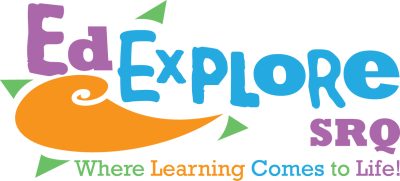For Parents
Experiential Learning
Hands-on learning is vital for students to fully understand the concepts we teach in the classroom.
Dr. Todd Bowden Jerde
Superintendent of Schools
Did you know that EdExploreSRQ is not only a tremendous educational tool for Sarasota County teachers and students but a great resource for parents and families as well? From information about local museums, theatres, performing arts venues, parks and science programs to a full array of intellectually-stimulating summer camps and kid-friendly activities, EdExploreSRQ offers you access to information about the best active learning experiences Sarasota has to offer for young minds.
History and Importance of Experiential Learning
While the idea that children learn better and remember more when they are actively engaged in hands-on experiences can trace its roots all the way back to noted American philosopher and education theorist John Dewey, it was not until the works of Lev Vygotsky, Kurt Lewin, Jean Piaget, Maria Montessori and, more recently, David Kolb that the term “Experiential Learning” became popularized. All did extensive research on the impact and value that hands-on, real-world experience has on student engagement and learning outcomes.
Today, as the pendulum swings away from skill-by-skill teaching and a reliance on rote memorization of facts, the value of Experiential Learning is more important than ever. Through this integrated approach to teaching, and learning, students are encouraged to see and understand the world around them and to make connections between different content disciplines in ways they may never have experienced before. Such an approach lends itself more than ever to incorporating authentic learning through the study of arts, sciences, culture, technology and history as they apply to the modern world.
Twelve Principles of Experiential Education Practice
1. Experiential learning occurs when carefully chosen experiences are supported by reflection, critical analysis and synthesis.
2. Experiences are structured to require the learner to take initiative, make decisions and be accountable for the results.
3. Throughout the experiential learning process, the learner is actively engaged in posing questions, investigating, experimenting, being curious, solving problems, assuming responsibility, being creative and constructing meaning.
4. Learners are engaged intellectually, emotionally, socially, soulfully and/or physically. This involvement produces a perception that the learning task is authentic.
5. The results of the learning are personal and form the basis for future experience and learning.
6. Relationships are developed and nurtured: learner to self, learner to others, and learner to the world at large.
7. Because the outcomes of experience cannot be totally predicted, the educator and learner may experience success, failure, adventure, risk-taking and uncertainty.
8. Opportunities are nurtured for learners and educators to explore and examine their own values.
9. The educator’s primary roles include setting suitable experiences, posing problems, setting boundaries, supporting learners, insuring physical and emotional safety, and facilitating the learning process.
10. The educator recognizes and encourages spontaneous opportunities for learning.
11. Educators strive to be aware of their biases, judgements, and pre-conceptions and how they influence the learner.
12. The design of the learning experience includes the possibility to learn from natural consequences, mistakes and successes.
All programs and activities on EdExploreSRQ have been approved by Sarasota County School District staff to meet the Florida Standards listed.
